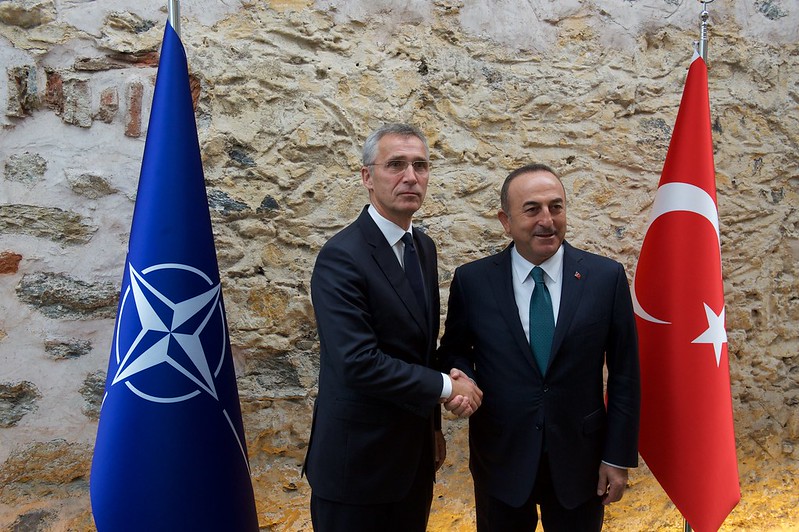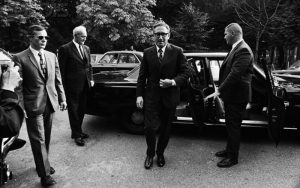In its contemporary history, Turkey has had a long-standing relationship with Europe and the West. Its integration into the transatlantic alliance in 1952 was perceived as being of strategic importance to Washington, as it covered the south-eastern flank of the alliance’s borders. This assessment stemmed from Turkey’s geostrategic location: at the junction of two continents and gateway to the Mediterranean from the Turkish Straits. Turkey had thus played a central role in the fight against the Russian-Soviet push towards the Eastern Mediterranean during the Cold War.
For Turkey’s leaders, joining the collective defence organisation was considered paramount to protect Turkey’s sovereignty against Russia’s territorial claims, in particular the Turkish territories of Kars and Ardahan on its eastern flank. It was also motivated by Ankara’s strategic desire to advance the Western/European identity of the Republic, promulgated by the founder of modern Turkey, Mustafa Kemal Atatürk.
In the current juncture, Turkey’s foreign policy is increasingly shifting away from its NATO partners and the Kemalist legacy. Under the leadership of Recep Tayyip Erdogan, Turkey is pursuing an aggressive foreign policy aimed at challenging the liberal international order. This has considerably alienated Turkey’s Western allies.
The thrust for strategic independence
Ever since the failed coup of July 2016 and the extension of Presidential powers, Erdogan has used this political leverage to assert Turkey on the international scene. Fascinated by the past Ottoman sultans, particularly Mehmed the Conqueror and Suleiman the Magnificent, the Turkish leader no longer hesitates to publicly question the 1923 Treaty of Lausanne, which established Turkey’s current borders. As a result, hard power has been Erdogan’s choice of excellence to strengthen Turkey’s influence on the international scene.
This was evident during October 2019, during which the volatile backdrop of the Syrian civil war gave Erdogan the pretext to launch a full-scale military intervention east of the Euphrates River. Publicly, the Turkish leader framed this aggressive response to create a refugee resettlement zone that stretches to Raqqa for the 3 million Syrian refugees currently in Turkey. In reality, the Turkish leader’s primary motivation was to prevent the formation of an autonomous Kurdish region on Turkey’s southern flank by the NATO-backed Kurdish People’s Protection Party (YPG). To the consternation of Ankara’s European allies – facilitated by Donald Trump’s withdrawal of US troops from parts of the region – Operation “Spring of Peace” resulted not only in the withdrawal of the YPG’s armed forces from the Turkish-Syrian border but also the escape of hundreds of foreigner terrorists affiliated with the Islamic State (IS) group. This has inevitably damaged Turkey’s international reputation, leading a number of NATO allies to suspend their arms sales to the country.
Erdogan’s quest for power has also seen Turkey’s military weight in Libya and Nagorno-Karabakh. The deployment of troops to North Africa and the South Caucasus is mainly motivated by the need to gain greater strategic economic autonomy. Galvanised by gaining a foothold east of the Euphrates, the Turkish leader quickly turned his attention to the long-running Libyan civil war and the assertion of the energy deposits of the Eastern Mediterranean. Against this geopolitical backdrop, Erdogan signed a maritime boundary agreement in the Mediterranean Sea with the head of the Government of National Accord (GNA) Fayez al-Sarraj on 28 November 2019, thereby nullifying Greek sovereign rights of the islands of Crete and Rhodes. The monopolisation of the offshore gas field is of strategic importance to the Turkish leader, as it would enable Turkey to overcome its dependence on energy imports and tackle its existing chronic economic problems.
Against this backdrop, Erdogan also signed a military cooperation agreement with the GNA leader – providing Turkey with the pretext to send troops to Libya at Tripoli’s request. This agreement only increased the volatility of the current security predicament, as Turkey sent Turkmen and Arab mercenaries from the Syrian civil war to the Libyan battlefield.
With the frontline frozen following the establishment of a ceasefire in October 2020, Ankara is now exerting its diplomatic efforts to consolidate its existing strategic gains with the new Libyan leadership, led by Abdel Hamid Dbeibeh. The businessman from Misrata is well acquainted with Turkey’s political circles and economic activities in Libya. Unsurprisingly, Dbeibeh’s first foreign outreach was to Ankara, resulting in Erdogan further consolidating Turkey’s energy and commercial interests in Libya, and Turkish companies given the green light to play a leading role in Libyan reconstruction projects. This naturally worries European NATO allies, as the Libyan Prime Minister’s pledge to support the 2019 Turkish-Libyan maritime agreement will inevitably prevent European countries from overcoming their dependence on Russian gas and prevent Greece from generating export revenues.
In the case of the recent flare-up of tensions between Armenia and Azerbaijan over the contentious issue of Nagorno-Karabakh, the revitalisation of pan-Turkic solidarity and the realisation of future economic gains were behind Erdogan’s military support for Ilham Aliyev of Azerbaijan. With the US in the midst of the November 2020 presidential campaign and election, the Turkish leader’s interference in this long-running conflict sparked widespread outrage and indignation across European chancelleries. This is not surprising, considering that Erdogan, since his alliance with the ultranationalist Nationalist Movement Party (MHP), has renewed his antipathy towards Armenia. The Turkish leader has been complicit in fuelling the recent explosive situation between Baku and Yerevan by notably declaring that Armenia is the greatest threat to regional peace. Naturally, Erdogan transferred several hundred Turkish-allied extremist fighters from the conflicts in Libya and Syria to the frontline, which has been decisive in Aliyev’s recapture of the seven adjacent districts of the enclave.
Increasing direct transport and trade links with the former Turkic republics of the Soviet Union were also behind Erdogan’s intervention. Providing Baku with the necessary ammunition to recapture the strategic province of Nakhchivan was critical to Ankara’s ongoing hopes to build a land corridor linking Turkey’s Igdir province with Azerbaijan and Central Asia. Already, preparations are underway to bring motorways and railway lines to the “Zangezur” corridor.
S-400 Missile Defence Systems Acquisition
The crisis in Turkey’s relations with NATO has also been epitomised by Ankara’s purchase of Russian-made S-400 air defence systems. This is essentially the result of grievances Erdogan has been nursing since the failed coup of July 2016 and since Washington’s support for the YPG in Syria. The security implication of this decision is simple: With an operational S-400 at the heart of Turkey’s air defence architecture, the entire NATO inventory of F-16 and F-35 fighter jets would be put at risk as Russia will be able to read their performance from a Russian system. At this stage, Erdogan has so far sought not to fully activate the controversial missile defence system. Certainly, Washington and other NATO allies will have serious difficulties securing Turkey’s legitimacy in the Alliance if the Turkish leader completely incorporates this air defence system into Turkey’s NATO arsenal.
Behind the scenes at the first NATO summit since the COVID-19 pandemic, Joe Biden and Emmanuel Macron made it clear to Erdogan that Turkey’s bellicose and authoritarian turn is a threat to the transatlantic security framework. Being the Alliance’s second-largest military force and a strategically important outpost for NATO, particularly against Russia in the Black Sea, Turkey remains an important ally of the West. It is equally undeniable, however, that Erdogan’s independent foreign policy has undermined Euro-Atlantic security. The question now is whether the current international juncture will induce Erdogan to return to the norms and values of the Alliance.
Sources Abdulrahim, R. 2020 ‘Turkish-Backed Syrian Fighters Join Armenian-Azeri Conflict’, The Wall Street Journal, 14 October 2020. AFP. 2021 ‘Turkish ‘kingmaker’ edges Erdogan further right’, AFP, 14 April 2021. BBC News. 2016 ‘Turkey’s coup attempt: What you need to know’, BBC, 17 July 2016. Butler, D & Gumrukcu T. 2019 ‘Turkey signs maritime boundaries deal with Libya amid exploration row’, Reuters, 28 November 2019. Daily Sabah & AA. 2021 ‘Zangezur corridor between Turkey, Azerbaijan to revive region’, Daily Sabah, 1 June 2021. Dalay, G. 2021 ‘Turkey, Europe, and the Eastern Mediterranean: Charting a way out of the current deadlock’, Brookings, Washington, United States. Gall, C. 2018 ‘Erdogan, Flush With Victory, Seizes New Powers in Turkey’, The New York Times, 19 July, 2018. Hongur, A. 2020 ‘Erdogan says Armenia ‘biggest threat to regional peace’, AA, 27 September 2020. Huseynov, V. 2021 ‘Azerbaijan Embarks on Construction of Nakhchivan Railway’, Eurasia Daily Monitor, 18(59). International Crisis Group. 2020 ‘Fleshing Out the Libyan Ceasefire Agreement’, International Crisis Group, Brussels, Belgium. Martin, J.M. 2021 ‘Abdul Hamid Dbeibah, a new hope for international society in the face of Russia’s and Turkey’s positions in Libya’, Altayar, 9 February 2021. McKernan, B. 2019 ‘At least 750 Isis affiliates escape Syria camp after Turkish shelling’, The Guardian, 13 October 2019. Newsroom. 2016 ‘Erdogan disputes Treaty -of Lausanne, prompting response from Athens’, Ekathimerini.com, 29 September, 2016. Sloat, A. 2019 ‘The U.S. played down Turkey’s concerns about Syrian Kurdish forces. That couldn’t last’, The Washington Post, 10 October 2019. The Arab Weekly. 2021 ‘Turkey, Libya recommit to contested maritime border deal’, The Arab Weekly, 13 April, 2021. Uras, U. 2021 ‘Analysis: Turkey’s new S-400 proposal offers olive branch to US’, Al Jazeera, 10 February 2021. Wintour, P. 2019 ‘Recep Tayyip Erdoğan proposes ‘safe zone’ for refugees in Syria’, The Guardian, 25 September 2019









Be First to Comment